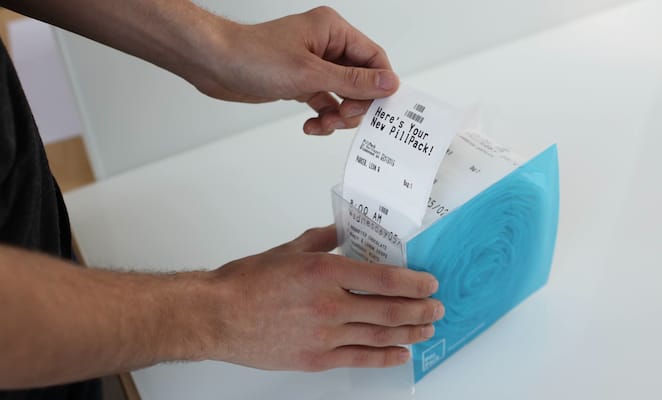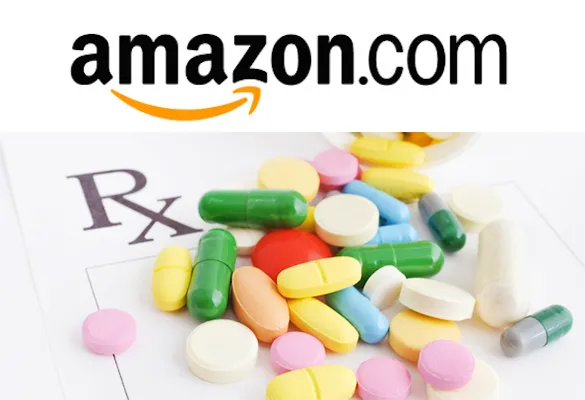
SEATTLE — Amazon.com has sent a major tremor through the retail pharmacy industry with its planned acquisition of PillPack, an online pharmacy that organizes prescriptions and vitamin supplements into daily dosage packets and delivers them to patients’ homes.
The deal, which Bloomberg News values at about $1 billion citing “a person familiar with the matter,” is expected to close before the end of 2018, subject to the usual regulatory approvals and customary closing conditions.
The purchase is the latest in a series of moves by Amazon that have rattled not only the pharmacy industry but the entire health care sector. Last October — just a month after its acquisition of grocer Whole Foods Market Inc. — it was reported that Amazon had obtained wholesale pharmacy distribution licenses in more than a dozen states, sending a shock wave through the sector.
Then in January, Amazon founder and chief executive officer Jeff Bezos joined Warren Buffett, CEO of Berkshire Hathaway Inc. and Jamie Dimon, CEO of JPMorgan Chase & Co., in announcing a new venture intended to lower the costs of providing health care insurance to employees.
But the acquisition of PillPack at a stroke brings Amazon directly into competition with retail pharmacy, including the largest drug store chains, CVS Pharmacy and Walgreens. Not only does PillPack bring to the combination an impressive array of proprietary assets, but it also has pharmacy licenses in 49 states and is in-network with all of the major pharmacy benefits managers, including CVS Caremark, Express Scripts Inc., Optum Rx, Prime Therapeutics, Humana Pharmacy Solutions, Cigna, Aetna Inc. (soon to be part of CVS Health), Medimpact, Rite Aid Corp.’s EnvisionRx and CastiaRx. The online pharmacy is also in-network with most of the major Medicare Part D plans.
Among its operational assets, PillPack has developed software that automates a number of tasks in the script fulfillment process, including verifying when refills are due, determining co-pays and confirming insurance coverage. It also has a staff of pharmacists who are thoroughly grounded in the company’s operating model.
Amazon will thus overcome several of the most serious obstacles to entry into the prescription drug business. As PlanetRetail RNG analyst John O’Leary points out, besides the extensive state-by-state licensing requirements, dispensing drugs is a complex process that requires significant expertise and carries serious liability.
“With PillPack, Amazon gains pharmaceutical distribution licenses in all 50 states,” O’Leary writes. “The company also has pharmacist head count to administer medication, the innovative sorting and packaging technology for the pills, the necessary billing programs and relationships with insurance companies, and the ‘pharmacy OS’ system for tracking patient data and managing safe doses.”
O’Leary also notes that the acquisition can tie in neatly with a number of other Amazon health care-related initiatives, including its launch of a line of private label over-the-counter medications in partnership with Perrigo Co. The online behemoth has also begun offering discounted Amazon Prime memberships to recipients of Medicaid, and has a team working on developing health care solutions centered on its Alexa voice technology.
Predictably, the news spooked analysts and investors in both CVS Health and Walgreens Boots Alliance (WBA). For example, Jefferies analyst Brian Tanquilut downgraded WBA’s stock to “Hold” from “Buy” and dropped its share-price target for the year by $20.
“We believe that the near-term earnings impact to WBA from Amazon’s acquisition of PillPack is likely immaterial, but the perception and concern that Amazon will successfully integrate PillPack into its consumer offering (one to two years out) will likely weigh on WBA stock near term and potentially impact actual earnings performance long term,” he wrote in a research note.
In response to analysts’ questions about the deal during WBA’s third quarter conference call, Pessina coolly described the Amazon-PillPack combination as “a declaration of intent from Amazon, let’s say.” He also flatly rejected the notion that his company should scramble for some sort of defensive merger or acquisition.
Meanwhile, there seems to be little doubt in the minds of many industry observers that CVS’ pending acquisition of health insurer Aetna, which only lacks regulatory approval, was conceived with one eye on Amazon’s eventual move into health care.









